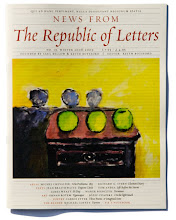For some reason which escapes me, the good folk at San Jose State have held an annual contest since 1982 in which contestants are urged to compete with the worst possible opening sentence of an imagined novel. The contest is named after the hugely successful novelist-cum-philanthropist and Dickens' close friend Edward Bulwer-Lytton because he began a novel with "It was a dark and stormy night. . .", the which innocuous phrase precedes every attempt by Snoopy to write a novel. The reason must be, in that citadel of learning, that someone has nothing better to do.
I will be accused of humorlessness, but I beg to differ with the principle. On the following grounds: (A) It is no great task to find far worse first sentences than Bulwer-Lytton's in existing novels written today, where they flourish by the dozen. (B) For Snoopy, already a literate and ambitious dog, that opening sentence certainly has a meaning and a reason behind it -- dogs don't like such nights; they shiver, bark, howl and cower. (C) Bulwer-Lytton, like many another neglected Victorian from the great age of the novel, was a writer of some substance.
Okay, so it's all in good fun. We like spoofs. The underlying truth is, however, that there are very few people left who can read Bulwer-Lytton: his language is alien, difficult, and requires effort and attention -- as does Dickens'. There is, on the Net, a professorial quiz which proposes that the reader identify specific passages of Dickens (presumably good) and Bulwer-Lytton (presumably bad). It is a tricky test and a false one. Other passages in either author could reverse the verdict. This gradual effacementof the literature of the past, and its language, is something we might deplore rather than seek to parody. My Oxford Edition of Our Mutual Friend contains many pages of notes to explain Dickens' fascination with, for instance, the specific languages of trades now long lost, doll-makers, conveyancing clerks, water-men, Philistines of the day and such. On my shelves is a treasured dictionary, the Dictionnaire du monde rural, in which one can recover the implements used in threshing, winnowing and other rural pursuits. Every language loses a part of its lexicon every day. Danbury, Connecticut, was the hat capital of America; now the only head-cover we see is the baseball cap. The loss is constant, and the language is not replenished by the conjugation or declension of 'f**k', which seems to be as far as common parlance goes. What is a writer to do if the language he uses erodes even as he writes?
It was a dark and stormy night when the profs of San Jose State thought they knew what bad writing was. Far greater pollution is shown daily and climate change can't be blamed for the poverty of our current language.
Lahti
2 years ago













I agree in respect to the poverty of language, especially considering when technological terms seem to short-circuit quality, living words. ("Tweet this," etc.) However, wouldn't Latin speakers in the 5th century have said the same of the invading barbarian tongues? Some good came of that overhaul.
ReplyDeleteAbout "difficult" language;
ReplyDeleteI really love Bellow´s Humboldt´s gift. Believe it or not, i have readed it over about 30 times. Why? I love the language and those expressions. It seems to me that this is one of the greatest novels of my time, because it last and every time after readiing i will find something new from it. Also Saul´s language in this is quite demanding, but it is also very deep, fresh even today, smooth and elegan Augie March had huge amount of details - sometimes i had difficult to keep my attention up because of this, but Humboldts gift is full of ideas and thoughts, also construction is quite simple.
I´m just writing and constructing my newest books, and i must say, that when text and story is deep, style and construction must be very clear. It is very hard to write so simple, that everyone understands, because when mental level of writer grows very high after hard work and years of thinking, it is easy to start to keep certain things as facts, which everyone knows. This can be fatal attitude, it creates novels for literature elite, which is not a bad thing, but also writer must try write to larger scene of readers. Or?
to both Jommi and Eugene, assiduous readers, let me assure you that barbarian (and civilized)languages are welcome. I was referring to the disappearance of our English lexicon or, more simply, in all languages, the fading away of the specific words that defined the things of our world. I wished it noted that as we dumb down, so we lose the capacity to read. The ten fingers that typed (or five in my case) became the two thumbs that twiddle and smiley away. Soon we won't understand each other at all: that is, we will understand the human beings whose selves can be expressed in 300 words: u r mfs. Are we just that?
ReplyDeleteYes, but have you been to San Jose lately. They're lucky to have any language remaining good or bad beyond acronyms for ordering an hamburger.
ReplyDelete